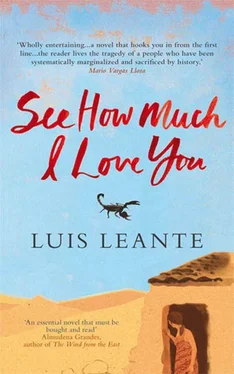The convoy changed course directly after seeing the woman signal to them from the most inhospitable area of the hammada . As they approached, the drivers and passengers could hardly believe their eyes. They were all, staring fixedly at the same spot. One of the four-by-fours ran ahead and stopped a few metres from the woman. An officer got out. His stripes made it obvious that he was the one in charge. As he walked up to her, he took off his sunglasses and loosened his turban. He started a long formulaic greeting, all the time studying the woman. If his men had not been following his every move, he would have touched her arm to make sure she was not a mirage. The greeting finished, his neutral tone changed and his surprise showed through. ‘What are you doing here? Where did you come from?’ he asked in an obviously annoyed voice.
‘I got lost.’
‘You got lost?’ he asked again, not believing her. ‘How did you get lost?’
‘It’s a long story, and I haven’t got much time,’ she replied, respectfully. The officer seemed spooked, as though he were talking to a ghost. ‘And how did you get here? How long have you been lost?’
‘I need to drink some water, I’m about to collapse.’ The rest of the convoy had stopped in a long line, and the soldiers got out of their vehicles. The officer opened the door of the four-by-four and took out a canteen covered in leather. Aza drank as much as she could. The water went into her mouth and flowed out of her pores, as if from a fountain. Then she sought the shade of one of the trucks. The soldiers looked at her without really grasping what was going on.
With a shout, the officer ordered them to go back to their vehicles. ‘Now explain to me how it was you got lost.’
‘It’s a long story, and there are more important things to be done.’
‘More important?’
‘Yes, over in that direction there’s a dying woman. She’s foreign. She was stung by a scorpion nearly twenty-four hours ago. She may be dead already.’ The officer grew agitated. He called over the driver of one of the four-by-fours and asked Aza to tell him where the exact place was. ‘It’s in that direction. I’ve walked in a straight line for eight hours. You could get there in twenty minutes.’ The driver and two soldiers left immediately. Meanwhile, the soldiers were forming another line near the woman, trying to remain inconspicuous. The officer began to lose his patience when no more information was forthcoming. ‘I need to go to my wilaya8 ,’ said Aza. ‘My two-year-old son needs me.’
‘What wilaya is that?’
‘Dajla,’ she lied.
‘God help you, woman. You’ll never get there from here.’
‘Where are you coming from?’
‘Smara’
‘Is that very far?’
‘Twenty kilometres.’ Aza saw the hand of Allah in what was happening. She looked around and mentally calculated the direction in which the Ausserd camp was. ‘I’ve got relatives in Ausserd,’ she said, trying to conceal the truth.
‘We’ll take you to Smara. As soon as they find the sick woman, a vehicle will take you to the hospital, and someone will inform your family in Dajla.’ Aza didn’t know how to get out of the situation. She was so ashamed of the truth that she would have preferred to start running and die in the desert than let those men even suspect what had happened. ‘I cannot go to Smara,’ she explained as casually as she could. ‘My sister is getting married in Ausserd in four days and she needs me.’ The lie irritated the officer.
‘You’ll go to Smara and there you’ll explain all there is to explain.’
‘If you take me to Smara I’ll accuse you of kidnapping me to the wali .’9 The officer clenched his fists and put on his sunglasses to hide his rage. He looked around and then strode away towards the plain of the desert. Aza went on drinking water, but now in smaller sips. The young recruits looked at her without even blinking. No doubt, the apparition of such a beautiful woman in the most deserted area of the hammada seemed miraculous. ‘Have you got any food?’ she asked calmly. All at once, the soldiers rummaged in their bags and took out dry biscuits, goat’s cheese and sugar. Aza sat down in the shade of the truck and began eating slowly, savouring every bite.
Less than an hour had gone by when the four-by-four returned with the foreign woman. The officer looked inside the vehicle and could not believe it. If the Saharawi woman had told the truth, perhaps she was not, as he had thought, crazy. ‘Is she dead?’ he asked the driver. ‘I couldn’t tell for sure.’ The officer approached Aza and pointed to the vehicle firmly.
‘Get in the car. My men will take you to Smara. Then you can go wherever you please.’ Aza stood up, put away the leftover food, drank some more water and said: ‘I need to know the way to Ausserd.’ The officer was about to lose his self-control. He bit his lip so hard he drew blood. He suspected that, if he insisted, that woman would make a fool of him in front of the troops. ‘Fine. If that’s what you want, carry on in that direction and don’t stray even this much. Walking steadily, you’ll reach Ausserd in ten hours.’ He emphasised the last sentence, in the vague hope that the woman would reconsider before walking away.
However, Aza put the water canteen on her head and approached the four-by-four where the foreign woman was. ‘Hurry up,’ she told the driver. ‘She’s been in a coma for hours.’ Then she began to walk in a straight line, without losing sight of the point on the horizon that was her only chance of salvation. The soldiers didn’t take their eyes off her until they heard their superior’s fearsome shouting.
The foreign woman’s hospital room is half in darkness, in spite of the furious sun outside. Layla is sitting on a rug on the floor, numb with heat, when the director of the hospital walks in, followed by his friend Mulud. On seeing them Layla stands up and buttons up her white coat. She exchanges an endless greeting full of formulae with the colonel. Then all three silently turn their eyes towards the patient. Layla adjusts her melfa and covers her head properly. The foreign woman is asleep, drawing deep breaths.
‘She’s had some food,’ explains the nurse to the director. ‘But she sleeps most of the time.’
‘Layla spends whole days here,’ the director says.
‘Only when I’m not busy,’ adds Layla.
The colonel smiles. He’s curious to learn the foreigner’s story.
‘Is she getting better?’ he asks.
‘She no longer has a fever,’ replies Layla. ‘Sometimes she hallucinates, but no fever. All I know is that her name is Montse and she’s from Spain. She’s obsessed with something, but I haven’t managed to find out what.’
‘Obsessed?’ asks the colonel.
‘She talks in her sleep and says the name Aza all the time.’
‘She’s obsessed with that name,’ echoes the director.
‘When she’s awake and I ask her about it, she says they’ve killed Aza. But she gets so upset that she can’t explain herself any further.’
Colonel Mulud stares at the foreigner. He is intrigued, but also very busy; he hasn’t got much time.
‘We need to ascertain how she arrived here,’ he says eventually. ‘Surely she hasn’t travelled alone. Someone must have reported her missing.’
‘Soon it will be a month,’ says the director. ‘It’s too long for a woman not to be missed.’
‘That’s true. The more I think about it the less sense it makes.’
‘I could try to find out,’ Layla says. ‘She’s better every day, but she’s really scared. I don’t know what happened to her, but she’s frightened. If I can get her to trust me, she might tell me.’
Читать дальше




![Ally Carter - [Gallagher Girls 01] I'd Tell You I Love You But Then I'd Have to Kill You](/books/262179/ally-carter-gallagher-girls-01-i-d-tell-you-i-lo-thumb.webp)







